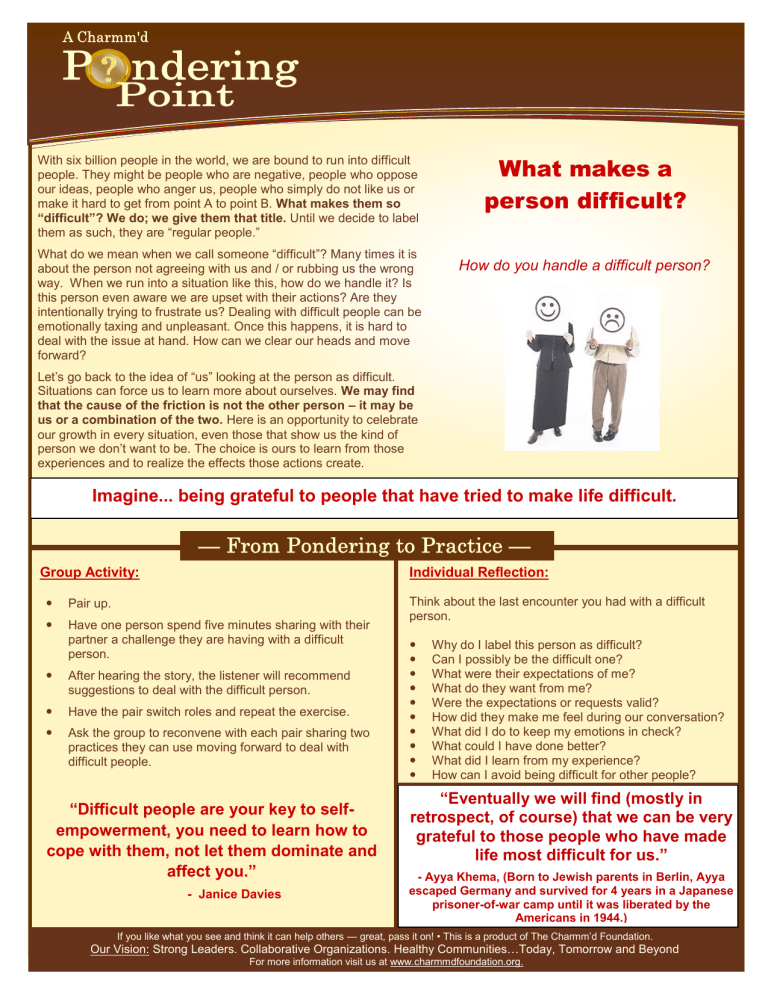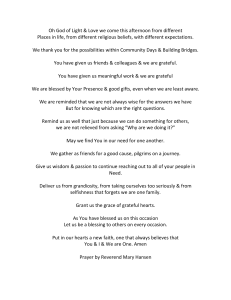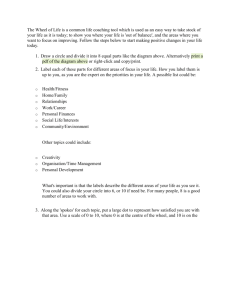What makes a person difficult?

With six billion people in the world, we are bound to run into difficult people. They might be people who are negative, people who oppose our ideas, people who anger us, people who simply do not like us or make it hard to get from point A to point B. What makes them so
“difficult”? We do; we give them that title.
Until we decide to label them as such, they are “regular people.”
What do we mean when we call someone “difficult”? Many times it is about the person not agreeing with us and / or rubbing us the wrong way. When we run into a situation like this, how do we handle it? Is this person even aware we are upset with their actions? Are they intentionally trying to frustrate us? Dealing with difficult people can be emotionally taxing and unpleasant. Once this happens, it is hard to deal with the issue at hand. How can we clear our heads and move forward?
Let’s go back to the idea of “us” looking at the person as difficult.
Situations can force us to learn more about ourselves. We may find that the cause of the friction is not the other person – it may be us or a combination of the two. Here is an opportunity to celebrate our growth in every situation, even those that show us the kind of person we don’t want to be. The choice is ours to learn from those experiences and to realize the effects those actions create.
What makes a person difficult?
How do you handle a difficult person?
Imagine... being grateful to people that have tried to make life difficult.
Group Activity: Individual Reflection:
Pair up.
Have one person spend five minutes sharing with their partner a challenge they are having with a difficult person.
After hearing the story, the listener will recommend suggestions to deal with the difficult person.
Have the pair switch roles and repeat the exercise.
Ask the group to reconvene with each pair sharing two practices they can use moving forward to deal with
Think about the last encounter you had with a difficult person.
Why do I label this person as difficult?
Can I possibly be the difficult one?
What were their expectations of me?
What do they want from me?
Were the expectations or requests valid?
How did they make me feel during our conversation?
What did I do to keep my emotions in check?
What could I have done better?
What did I learn from my experience?
How can I avoid being difficult for other people?
“Eventually we will find (mostly in difficult people.
“Difficult people are your key to selfretrospect, of course) that we can be very empowerment, you need to learn how to cope with them, not let them dominate and affect you.” grateful to those people who have made life most difficult for us.”
- Janice Davies
- Ayya Khema, (Born to Jewish parents in Berlin, Ayya escaped Germany and survived for 4 years in a Japanese prisoner-of-war camp until it was liberated by the
Americans in 1944.)
If you like what you see and think it can help others
— great, pass it on! • This is a product of The Charmm’d Foundation.
Our Vision: Strong Leaders. Collaborative Organizations. Healthy Communities…Today, Tomorrow and Beyond
For more information visit us at www.charmmdfoundation.org.



